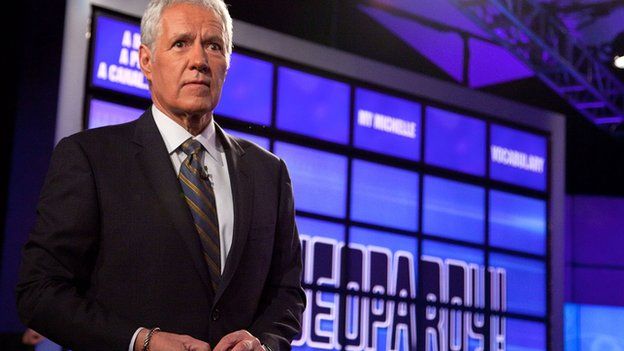Game show thinks it knows 'what women want'
- Published
- comments

What do women want? According to answers in a category on the syndicated television game show Jeopardy Monday night, they're longing for things like jeans that fit, herbal tea, time to do crossword puzzles and exercise, and a husband who vacuums.
The segment caught the attention of Claire Schlissel of the website the Jane Doze, who tweeted a screen shot of one of the Jeopardy prompts. "Are you serious, @Jeopardy?" she asked.
Actress/activist Sophia Bush retweeted Schlissel's message to more more than a million followers shortly thereafter, adding: "For a 'smart' show, you just got seriously stupid."
The outrage kicked into high gear.
Mashable's Neha Prakash published screen shots of all the jeopardy questions and provided her own commentary.
"Unfortunately, the category was not a cute play on words and was, instead, a series of clues spotlighting female stereotypes," she writes.
She concludes:
"The small silver lining to the episode was that a woman, Elisa Korn, took home the win for the evening. Hopefully the $26,400 will be enough money to buy Elisa all the Levi's, tea and Pilates classes she wants."
Jeopardy's segment trafficked in worn stereotypes worthy of a 1980s Cathy comic strip or an old stand-up routine by comedian Tim Allen, writes Maggie Serota of Death and Taxes blog.
She adds:
"Things like 'the feeling of safety while walking alone at night' and 'access to affordable birth control and reproductive services' didn't figure into this narrowly defined and reductionist catalogue of female desire."
Bustle's Lucia Peters says that there's nothing wrong with liking or supporting any of the things listed in the Jeopardy category - plenty of women drink tea and love crossword puzzles.
"So do many men, for that matter - as do all people, no matter where they rest on the gender spectrum," she writes. "Which brings us to the point. Jeopardy writers? You should know better than to try to make sweeping generalisations about any sizeable population. Not cool - and, in fact, as harmful as it is insulting."
She goes on to list possible follow-up for the game show that features stereotypical things men like to do, like watch football and pro wrestling, wear steel-toed boots and drink beer.
"It's time to say goodbye to ridiculously outdated stereotypes," she says. "They're not doing anyone any favours."
The BBC speaks to women in Colorado about what issues matter to them ahead of the mid-term elections.
The average age of a Jeopardy viewer is 64, notes Jezebel's Tracy Moore, so the show's target demographic may have been just fine with a category that seemed more representative of 1950s domestic tropes.
"Hey, it's possible that if you were born in 1950 that the 'What Women Want' category doesn't seem especially sexist; it is simply How Things Are/Were," she writes. "Not so much now."
This latest incident isn't the first time Jeopardy has been criticised for a sexist slant in its subject matter. Exactly one year before the controversial episode aired, Salon's Deborah Sosin wrote about pro-male bias in the game show's category choices.
She studied 18 episodes of the show and found that of the 251 possible answers in categories that could include questions about men or women, 75% were male.
"Now, one could argue that there are simply more famous men than women," she writes. "Maybe I should accept that for centuries women were in the kitchen, whereas men were free to create stuff, explore places and build things."
But she reports that even in categories such as "music legends", which could lend themselves to equal representation for women, the answers still tilted disproportionately toward men.
With prominent product placement in all of the controversial questions on Monday night, maybe this was a synergistic marketing campaign gone horribly wrong.
Did Levi jeans, Celestial Seasonings' Sleepytime tea, Bissell vacuums and the New York Times pay for these plugs?
If so, given the controversy, can they ask for their money back?